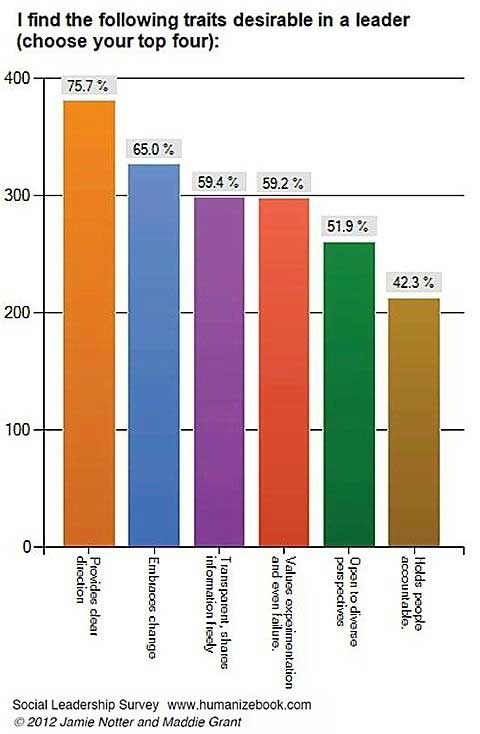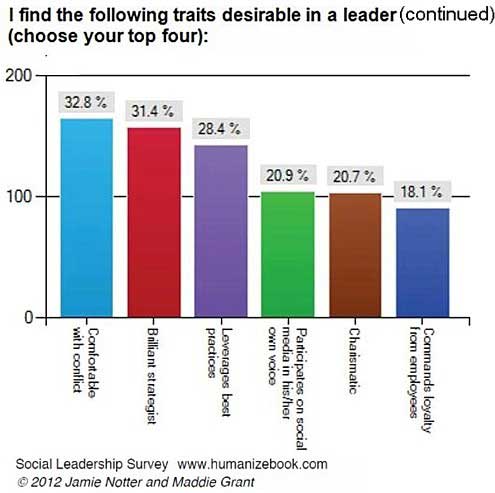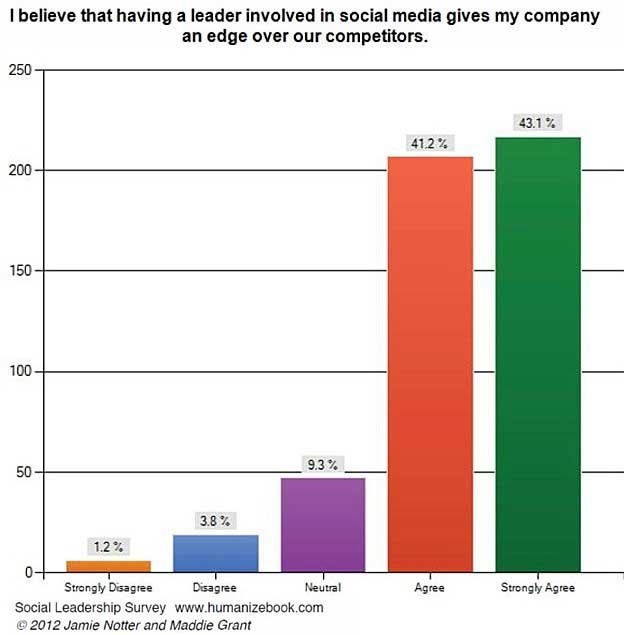People who work in companies that are actively using social technologies tend to value a more humanistic approach to corporate leadership over more traditional "command-and-control" methods, according to the 2012 Social Leadership Survey, conducted by Jamie Notter and Maddie Grant.
The new report examines how companies and corporate leaders participate in social media, and how today's corporate environments, changed by social media, require leadership methods that include "people-centric" principles.
Importantly, researchers polled the opinions of business professionals working in companies that have fully embraced social media. For example, among those surveyed:
- 85% said they worked in a company that understands the value of participating in social media and maintaining an online corporate identity.
- 84% said they are able to participate in social media in their own voice.
- 84% said their organizations use social media to connect with people, not just promote products and services.
- 68% said their company routinely collects and responds to customer feedback.
Also, many of the professionals surveyed said their companies enjoy some level of executive-level support for social media:
- 64% said their corporate leaders are involved in social media.
- 48% said any employee can speak for the organization online.
- 40% said their company offers training for staff on how to use social media.
Below, additional findings from the 2012 Social Media Survey, conducted by Jamie Notter and Maddie Grant, co-authors of the book titled "Humanize: How People-Centric Organizations Succeed in a Social World."
Desirable Leadership Traits
Participants were asked to identify the traits they found most desirable in a leader. At the top of list was providing clear direction (75.7%), followed by embracing change (65.0%), transparency (59.4), valuing experimentation and failure (59.2%), and openness to diverse perspectives (51.9%):

Interestingly, people don't necessarily want a leader who is continually tweeting or blogging: Only 21% of business professionals cited "participates in social media in his/her own voice" as among their top 4 (out of 12 traits). Only "charismatic" and "commands loyalty from employees" received fewer selections among the 12 attributes listed:

The findings highlight a key trend, according to the report: Traditional leadership practices fall short in the new digital world.
For example, among survey participants, apart from "providing clear direction" the most important traits cited were not those typically associated with traditional leaders (e.g., shares information freely, values experimentation and even failure, and is open to diverse perspectives).
By contrast, traditional leadership practices, developed in the industrial era, favor control, accountability, emphasis on the center/top of the organization, consistency, repeatability, and efficiency, according to the research.
However, social technologies have transformed the world by giving people the power to create, share, and learn (which are more human drivers, than machine drivers). Because of this massive shift, managers need to move toward more humanistic principles to be successful.
Such people-centric traits include embracing change, being transparent, valuing experimentation, being open to diverse perspectives, being comfortable with conflict, and using social media authentically (i.e., in their own voice), according to the authors.
Management Involvement in Social Media
Not surprisingly, people understand that management's involvement in social media is important: 84% of business professionals agreed that communicating core values via social media is integral to leadership with 46% strongly agreeing so. Only 4% said a leader's involvement with social media should be limited to crisis situations.

Even so, 45% of business professionals were at least somewhat concerned about their leader's lack of involvement in social media, 20% were neutral on the issue, and 30% were not concerned about leadership's role in social media.
About the study: Findings are based on a poll of 504 business professionals conducted September to October 2012 as part of ongoing research related to the concepts in Humanize: How People-Centric Organizations Succeed in a Social World by Jamie Notter and Maddie Grant.




